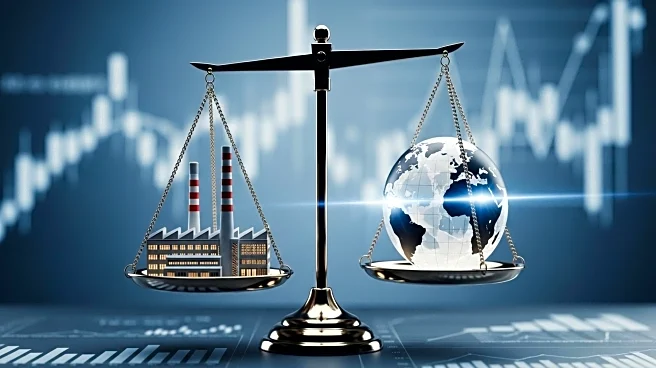What's Happening?
Carl Zulauf, professor emeritus at The Ohio State University, has addressed the complexities of tariffs and their impact on U.S. production and economic strategy. In a presentation to farmers and agribusiness leaders, Zulauf explained that tariffs act as a tax, raising the price of goods and potentially encouraging domestic production. However, he questioned whether a proposed 15% tariff is sufficient to stimulate American businesses to produce goods domestically. Zulauf highlighted the challenges of economic analysis in the current environment, where multiple variables are changing simultaneously, making it difficult to apply traditional scientific methods.
Why It's Important?
The discussion around tariffs is crucial as it affects various sectors of the U.S. economy, including agriculture and manufacturing. Tariffs can lead to increased production costs and consumer prices, impacting economic growth and prosperity. The debate over the effectiveness of tariffs in stimulating domestic production is significant, as it influences policy decisions and trade agreements. Understanding these dynamics is essential for stakeholders, including policymakers, businesses, and consumers, as they navigate the complexities of global trade and economic strategy.
What's Next?
The ongoing debate about the effectiveness of tariffs in promoting domestic production will likely continue, with stakeholders evaluating the trade-offs involved. Policymakers may consider adjustments to tariff levels or explore alternative strategies to support U.S. industries. Businesses will need to assess their production capabilities and cost structures in light of potential tariff changes. The broader economic implications, including potential inefficiencies and consumer impacts, will be key considerations in future policy discussions.
Beyond the Headlines
The discussion raises broader questions about the role of government intervention in the economy and the balance between protecting domestic industries and fostering market efficiency. It highlights the potential for tariffs to create inefficiencies over time, as businesses may become less competitive without market pressures. The debate also touches on cultural and economic values, such as the importance of capitalism and economic incentives in shaping U.S. economic policy.











